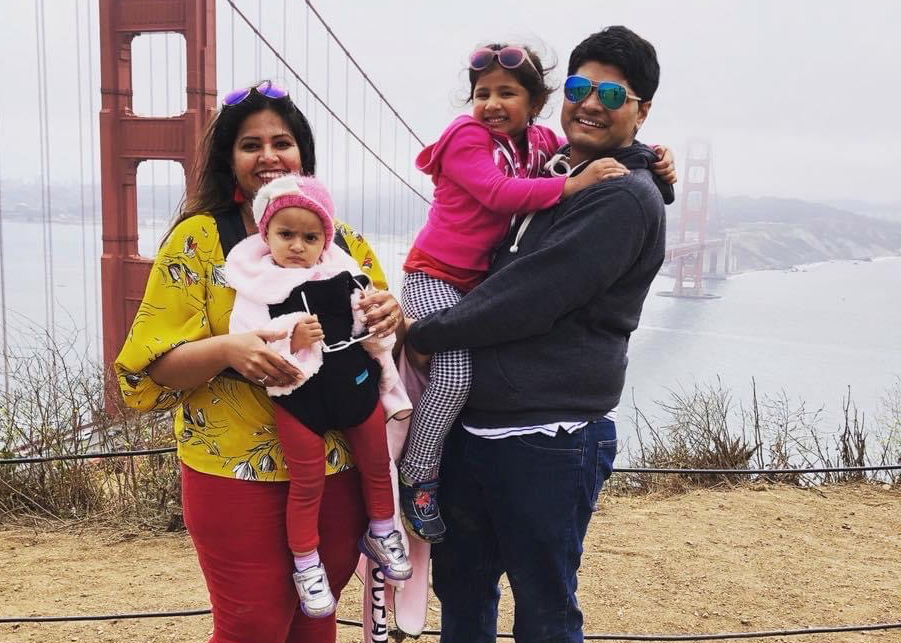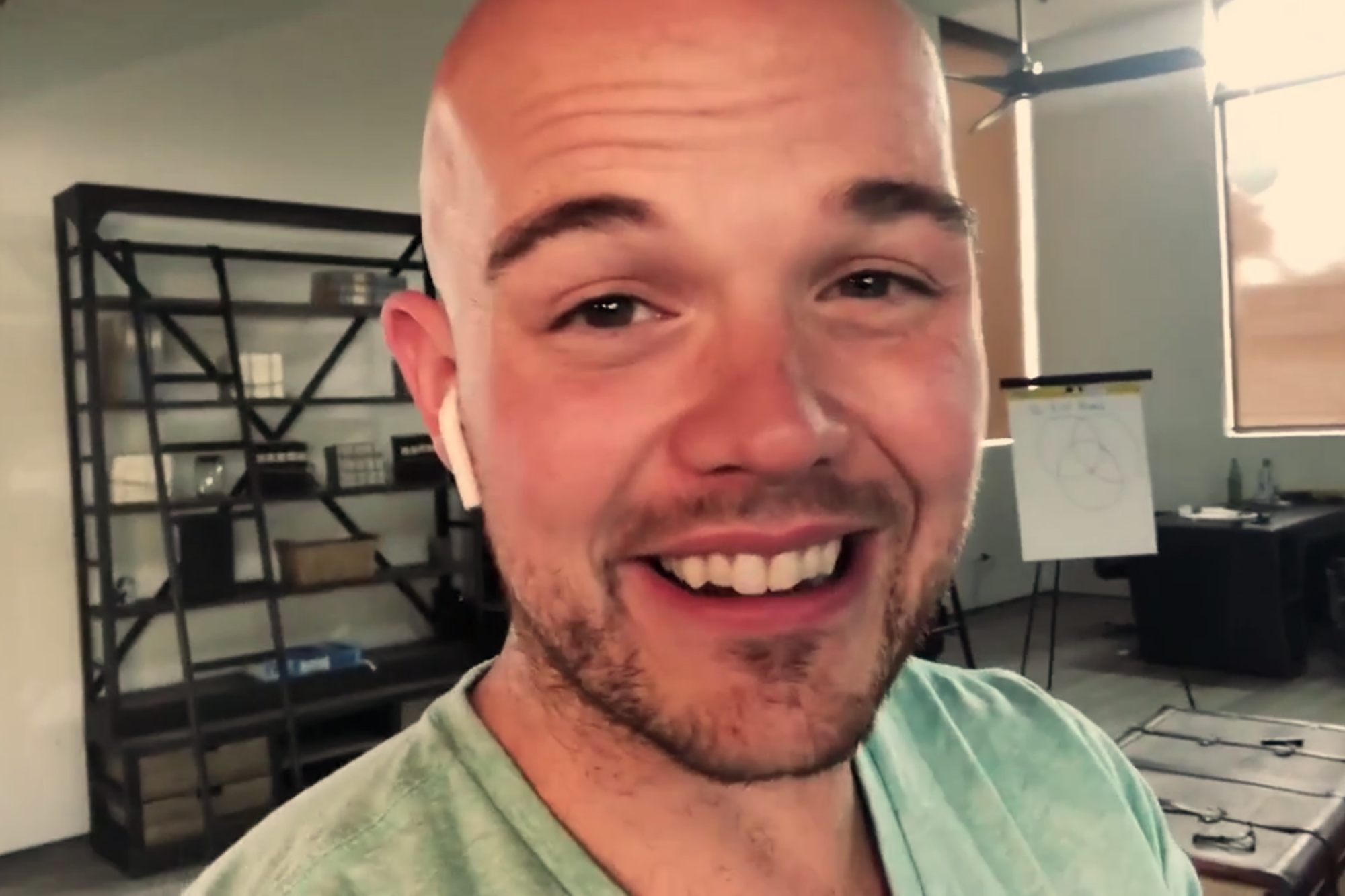Poorva Dixit left her husband and daughters in Fremont five months ago to care for her dying mother in India. Now, she’s grieving and stranded near Mumbai.
Dixit has been separated from her family and the country she’s called home for more than a decade by a double blow: the coronavirus pandemic and an H-1B visa order that slammed shut the border for thousands of foreign citizens who live and work in the U.S. but were overseas when President Donald Trump’s rule took effect.
“The day I heard about the executive order I was literally shivering,” said Dixit, 37, who is staying in her father’s home. “I didn’t know what was next for me and my family. My kids are definitely suffering. When they’re in deep sleep they cry and call for me.”
She already missed her older daughter’s birthday and she’ll probably miss her younger daughter’s birthday, too. “I’m going to be having a lot of mom guilt the rest of my life,” said Dixit.
Dixit, who has lived and worked in the U.S. since getting a master’s degree in information networks and computer security from the New York Institute of Technology in 2006, is one of an estimated 4,000 or more U.S.-based Indian citizens stuck in India after Trump’s June “Proclamation Suspending Entry of Aliens Who Present a Risk to the U.S. Labor Market Following the Coronavirus Outbreak.”
The order immediately barred entry until at least Jan. 1 to anyone on an H-1B or L visa who was outside the country with an approved visa but without a routine but crucial passport stamp on the day the proclamation took effect. Those stamps became impossible to get when the pandemic closed consular services.
But even if visa services in India resume, and no date has been set, traveling foreign workers and new visa holders would still be barred under Trump’s proclamation. The State Department last week said H-1B holders seeking to return to the U.S. to the same jobs under the same visa classification could apply for emergency approval, but with limited services, some embassies and consulates “may not be able to accommodate your request.”
Dixit, employed by a healthcare technology firm, has had an H-1B visa since 2009 and knew the rules. As soon as she bought her ticket to India, she booked her embassy appointment. “I wanted to make sure I was coming back to my family,” she said. But the embassy shut visa services March 16, the day before her appointment, under a world-wide coronavirus suspension by the U.S. Department of State.
She and about 50 other Indian H-1B holders and their dependents are suing federal officials over the entry ban, part of the Trump administration’s latest crackdown on immigration and foreign workers. Facebook, Apple, HP, Uber, Twitter, Intel and Adobe last week joined about four dozen other U.S. tech firms filing a letter in support of a separate lawsuit over the order by the National Association of Manufacturers.
“The consulates and embassies abroad are starting to reopen slowly,” said Julie Gelatt, an analyst at the non-partisan Migration Policy Institute. “As they start to reopen, that’s where the impact of the proclamation becomes especially stark.”
In the Bay Area, technology giants rely heavily on the H-1B, intended for highly skilled workers, and tens of thousands of foreign citizens on the visa live and work in the region.
Tech firms have long pushed to increase the annual 85,000 cap on new visas, arguing they need more of them to secure the world’s top talent. Critics claim tech companies and staffing firms use the H-1B to drive down wages, supplant U.S. workers and facilitate outsourcing.
The vast majority of H-1B holders are Indian citizens.
In his proclamation, Trump said the pandemic had cost more than 20 million U.S. workers their jobs in “industries where employers are currently requesting H-1B and L workers to fill positions.”

Sameer Arora, an electrical engineer from Milpitas with a post-graduate degree from the University of Texas, is stranded at his mother’s home near New Delhi with his wife and 18-month-old son.
“When I graduated from my Ph.D program they told me, ‘You should be proud of yourself, you are at the top.’ They talk on merit-based immigration. And then they throw me out,” said Arora, 34, who moved to the U.S. for school in 2010 and works as a design engineer for Renesas Electronics, a computer hardware maker. “I don’t understand that part.”
His wife, Malavika Parthan, a Cisco network engineer also on the H-1B, has a visa stamp, he said. Though she could return home, she and their son have stayed with him.
The family flew to India for a family emergency, but he couldn’t get his passport stamp in India. The embassy closed two days before his appointment, he said.
Now, he and Parthan are struggling to figure out a next step: Should she and their son return home without him? Should the family stay together? How long can they pay for a home and car they lease in the Bay Area but can’t use? “We don’t know what to do,” Arora said.

Milpitas software engineer Darshak Shah and his fiancee, an H-1B holder working in North Carolina, didn’t expect major hitches when they flew to their native country in late February to get married in March. They planned to return quickly to the U.S. to start their lives together in the Bay Area.
But Shah, who arrived in the U.S. in 2015 and has a master’s degree from Northeastern University in Boston and an H-1B visa, is now stranded with his new wife in the country where they were born but no longer live.
“I paid a lot of tuition for my graduate program,” said Shah, 30, who works at consulting and engineering firm EPAM Systems. “I was definitely contributing to the economy as well as paying all the taxes and everything.”
Shah is living in a home he owns in India, but still paying rent and insurance on his Bay Area house, and although he’s able to work remotely for now, his employer wants him back with his team, and he worries he could lose his job, he said. “This is causing a lot of mental, psychological and financial stress,” he said.
The White House and U.S. Department of State declined to comment. The State Department said consular officers abroad were receiving guidance on implementing Trump’s order, but that such guidance is not public information.
At a time when the pandemic has left so many U.S. workers unemployed, “it does make sense to think carefully about what foreign workers we let into the country,” analyst Gelatt said.
However, she said, H-1B workers contribute to the economy, in many cases creating jobs or becoming entrepreneurs: assets that will be important for post-coronavirus economic recovery. “It doesn’t make longer-term economic sense to block higher-skilled workers from entering the United States,” she said, adding that the order could push companies to move jobs and work offshore.
Dixit is left worrying about what’s next. If she continues to work remotely, she believes she’ll have to switch over to the India-based payroll of her employer, Rally Health. That would mean losing substantial income and her health insurance, which also covers her children, she said.
“I’ve worked really hard, I’ve missed a lot with my family. And after doing all that, this is what I get,” Dixit said. “I have already lost my mother and now I’m being kept away from my motherhood.”










